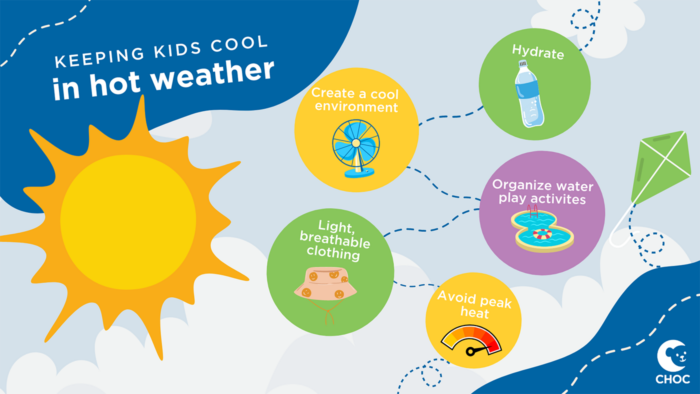How to prevent heat illness in kids
As a parent, you want to help your child make the most of the long days, sunshine and outdoor activities that summer brings. But when the temperatures rise, your kids can get sick if they are too hot and not drinking enough water.
To help, Dr. Leila Iravani, a pediatrician in CHOC’s primary care network, explains the signs of heat illness and offers tips for keeping your kids safe and cool. That way, your family can enjoy all that summer has to offer.
5 ways to help your kids stay cool during hot summer weather

 Print this
Print this
1. Hydrate
Make sure your kids are drinking plenty of water throughout the day to avoid dehydration, especially if they are participating in outdoor activities like sports or day camps. Encourage your child to carry a water bottle and set reminders for regular water breaks.
Use these fun ideas from our article, “How Much Water Should Kids Drink?”, to encourage more hydration for your kids during the summer:
- Make fruit-infused water or ice cubes.
- Enjoy fruits and veggies that are high in water content like watermelon, cucumber, zucchini, celery and berries.
- Fun water bottles or sippy cups.
- Fruit smoothies made mostly of water.
- Homemade popsicles with a little fruit juice and lots of water.
- Swap healthy drink alternatives for your child.
2. Create a cool indoor environment for rest time.
Both parents and kids may feel more tired in hot weather, so plan to take more breaks indoors and try to make your home as cool as possible. Close your curtains or blinds in your home during the hottest part of the day to keep out as much sunlight and heat as possible. Utilize an air conditioner or fans to keep your home at a cool temperature.
If you don’t have air conditioning and the fans aren’t helping, visit your local library or community center for a cool break indoors.
3. Use water to cool off.
When your child is feeling hot, a cool shower or bath can help cool them off. If you are heading out of the house, consider filling up a spray bottle so you can mist your kids on the go.
Organize water play activities like swimming, water balloons, sprinklers or playing in kiddie pools in the backyard. Make sure to supervise your children and practice water safety.
4. Make sure your kids wear light and breathable clothing.
Loose-fitting, light-colored and breathable clothing (like cotton) can help your child stay comfortable by allowing air circulation. But keep sun protection in mind, too! Absorbent material can help keep your kids cool and covered up from the sun to prevent sun-related skin reactions.
Don’t forget to apply sunscreen.
5. Limit outdoor activities during peak heat.
Try to plan your outdoor activities during the cooler times of the day like the early morning or late afternoon. The hottest part of the day is usually between 10 a.m. and 4 p.m. If your kids are participating in activities during that time, make sure they hydrate, take breaks and can cool off in water or indoors.
What are signs of heat illness?
If your child is not drinking enough water during hot days, says Dr. Iravani, they may begin to have symptoms of heat illness such as:
- Increased thirst.
- Weakness.
- Irritability.
- Headache.
- Dizziness or fainting.
- Muscle cramps.
- Nausea and/or vomiting.
- Increased sweating.
- Cool, clammy skin.
- A raised body temperature, but less than 104°F (40°C).
What to do if your child shows signs of heat illness
- If your child experiences symptoms of heat illness:
- Bring your child to a cooler place indoors, an air-conditioned car, or shady area.
- Remove your child’s excess clothing.
- Encourage your child to drink water or cool fluids containing salt and sugar — such as electrolyte water and drinks or even sports drinks.
- Put a cool, wet cloth or cool water on your child’s skin.
- Call your pediatrician for advice. A child who is too exhausted or ill to drink or who does not feel better within an hour might need to get intravenous (IV) fluids.
Dr. Iravani and the CHOC team hope these tips help you and your family stay cool this summer. Get more summer safety tips from CHOC experts.
For more health and wellness resources from the pediatric experts at CHOC, sign up for the Kids Health newsletter.
Find a CHOC Primary Care Pediatrician
From babies to teens, pediatricians from CHOC’s Primary Care Network partner with parents to offer immunizations, sick visits, sports physicals and more.





